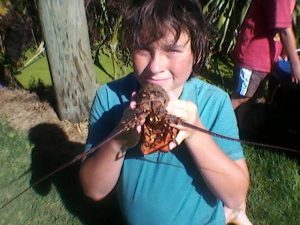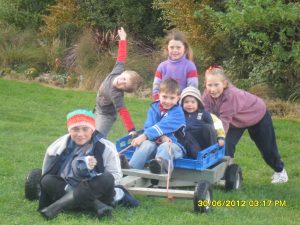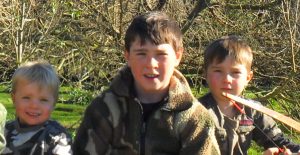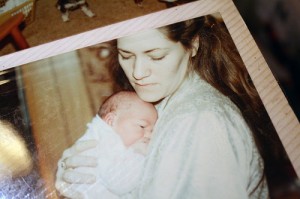
by Karyn Wills | Feb 10, 2014 | 2014, Awareness, Being Thankful, Brothers, Childhood, Education, Family, Food, Health, Life Balance, Life Lesson, Milestones, Motherhood, Nature, New Zealand, Nutrition, Older Children, Parenting, Relationships, Traditions, Travel, Vacationing, World Motherhood
 One of my enduring memories of childhood is of trapsing over paddocks, up and down hills, in gumboots too big for my feet picking mushrooms or blackberries. Eventually getting sore heels and aching legs. Eventually filling buckets and ice-cream containers with food.
One of my enduring memories of childhood is of trapsing over paddocks, up and down hills, in gumboots too big for my feet picking mushrooms or blackberries. Eventually getting sore heels and aching legs. Eventually filling buckets and ice-cream containers with food.
Probably scrapping with my sisters. Probably moaning about having to do so. Definitely covered in blackberry juice and scratches on blackberry days. Definitely not impressed by having to pick mushrooms, which I didn’t like to eat.
This summer holiday, my boys got to harvest their own food. Not blackberries and mushrooms, though. They got to harvest seafood.
Tuatua (too-ah-too-ah) are a shellfish. The children love to collect them. We go out at almost low-tide or just after low-tide in thigh-high water. We do the Twist. Our feet sink into the wet sand and feel around for something hard. When we find one, we reach down and pick it up with our hands.
Sometimes, we are side-swiped by a wave. Sometimes, we pick up a round hard sea-biscuit instead. At times, instead of the Tuatua-Twist there is a Crab-Bite-Leap with occasional bad-language. There is almost always laughter and a competition to see who can find the most. This year, the boys and their cousins also took responsibility for collecting fresh seawater twice a day, to keep the Tuatuas in, while they spat out all the sand inside their shells. They kept them cool in the fridge and, when they were finally cooked, the children ate them: some with gusto, others not so much. To me, they taste a bit like chewy seawater…
Our eldest son, 12 year-old Joe, with his 13 year-old girl cousin, Billie, trapped their own crayfish.
Crayfish are related to rock-lobster and, in our extended family, are usually trapped off-shore and by boat, or dived for with scuba-gear and tanks. Joe and Billie had kayaked out around a small peninsula and discovered an old craypot on the rocks. They dragged it out of the sea and managed to convince their fathers to repair it. They then kayaked it out again and dropped it on a good rocky spot.
Each day they went out to check their pot, just as the adults do the other craypots. The first day they caught – seawater. The second day they caught – seawater. The third day they were a bit fed up and otherwise occupied, so didn’t go out. The fourth day or maybe it was the fifth, Billie was out fishing and Joe went out alone to see what was there and to bring the pot in for good. He was very excited to discover they had caught a legal-sized cray! Yes, duly cooked and eaten.
In these days where many children don’t know that carrots grow in the ground or that their meat comes from a real animal, I love that our boys are sometimes involved in the process of food-collection and the processes of preparing it for a meal. I know that these are the Good Old Days and these moments will create some of their childhood memories.
Do your children do similar things you did as a child? Are they involved in collecting or harvesting their own food?
This is an original post to World Moms Blog from our writer in New Zealand and mum of three boys, Karyn Van Der Zwet.
The image used in this post is credited to the author.
Karyn is a teacher, writer and solo mother to three sons. She lives in the sunny wine region of Hawke’s Bay, New Zealand in the city of Napier.
More Posts

by Karyn Wills | Nov 4, 2013 | Being Thankful, Brothers, Childhood, Family, Family Travel, Friendship, Home, Inspirational, Kids, New Zealand, Older Children, Parenting, Relationships, Siblings, Traditions, Travel, Uncategorized, Vacationing, World Motherhood, Younger Children
 I have three sons and they are a lot of fun. They are also a lot of noise, mess and busyness.
I have three sons and they are a lot of fun. They are also a lot of noise, mess and busyness.
They adore one another most of the time and loathe one another at other times. Needless to say, living in a small house can get a little hectic and the fact that we live a car trip away from most of the boys’ friends—and I don’t always want to drive to fetch or deliver children—means that, from time to time, my boys can have a little too much of one another.
We are one small family and that can make us all tiresome to one another – no matter how strong the love between us.
The healthiness of living in an isolated, nuclear family unit has always bothered me a little. Not that living with my extended family or my in-laws would suit me, or them I suspect, either. But the cousins. Oh my goodness. The wonder of having cousins around – that appeals to me.
With cousins there is the common bond of grandparents and other family members, and the common history and the common family rituals. There is the emotional connection of knowing they all belong together, and the emotional connection of having been all together for their life times.
But, what I really love is the bond I see between our boys and all of their cousins in terms of visible affection and loyalty. When we have been away on holiday together, older cousins have often taken our boys off for adventures or have played with them, especially as babies and toddlers, so I could have a break. Younger cousins provide opportunities for my older boys to teach and help, in their turn. Sometimes it’s just fun to hang out together.
With their cousins, my boys are learning that things their brothers have said to them repeatedly, and they have ignored, are often the same opinions of others – and their cousins are not afraid to tell them so, sometimes bluntly. They are learning a higher level of co-operative skills and greater negotiation techniques, than they get to use with just two others. They are learning to walk away, when they need to walk away, and they are learning when it is appropriate to comment on another’s behaviour and when it is best to stay silent.
Like their brothers, their cousins love them. Unlike their brothers, their cousins are listened to. Like their friends, their cousins enjoy playing with them and will tell them to go away, when they‘ve had enough – but only for a short while. Unlike their friends, they cannot be transient members of their lives. And that last point, in particular, I love.
Do your children have good relationships with their cousins? Do you see a deeper bond between your children and their cousins, than with their friends?
Karyn is a teacher, writer and solo mother to three sons. She lives in the sunny wine region of Hawke’s Bay, New Zealand in the city of Napier.
More Posts

by Karyn Wills | Sep 2, 2013 | Brothers, Childhood, Education, Family, Life Balance, Motherhood, Nature, New Zealand, Parenting, World Moms Blog, World Motherhood, Younger Children
 When my boys were learning to roll over, I never stopped them from bumping their heads on the floor. We had carpet, vinyl and tiles, and they had access to all of those surfaces and often rolled from one to another. By the end of the first week there had been a few bangs and tears, but nothing that couldn’t be sorted with a cuddle and rock in my arms – and they had all learned to lift their heads up as they rolled.
When my boys were learning to roll over, I never stopped them from bumping their heads on the floor. We had carpet, vinyl and tiles, and they had access to all of those surfaces and often rolled from one to another. By the end of the first week there had been a few bangs and tears, but nothing that couldn’t be sorted with a cuddle and rock in my arms – and they had all learned to lift their heads up as they rolled.
I didn’t really think about this approach much but assigned it to other events as they grew. I did things like: holding my hand over the corner of a table when they toddled by; casually pointing out the floor was wet after I had mopped it; physically turning them around as they crawled down our concrete steps, so they could get down backwards; making sure they had one bed they could bounce on; and showing them how to get out of the trees they had climbed. As a result by the age of four they could all do things like; cut food and sticks using sharp knives, get themselves out of tight spots, and use a battery-drill and an iron without hurting themselves. By then they knew the difference between tools and toys.
I never pushed them or even encouraged them to do these things; I just (mostly) allowed them to as they were inclined to, taught them a few tricks, and turned up with plasters and cuddles when things didn’t go according to plan.
I have come to accept that children are driven to seek a certain amount of danger and I have found the more I have allowed my boys to set the pace of their ‘dangerous’ behaviours the more self-assured and capable they have become, and more aware of the risks NOT to take.
They occasionally have bitten off more than they could chew (when four years old, our eldest decided to ride around our block alone on his bike, he didn’t want to do that again for another two years) but most often than not they have taken small steps, fast. I often see children who have not been allowed to take the same small steps and they seem, to me, to be either too timid to take any chances or they over estimate their abilities to truly dangerous levels.
There seem to be two strong opposing forces in New Zealand parenting at the moment. One in which ‘safety first’ is the catch phrase, and the other which emphasises the importance of children being allowed to take measured risks. It seems I’ve ended up on one side of this debate without even trying, but now am really pleased that I have taken the approach I have taken.
What’s the approach to danger in your house? Do you think children need to be kept safe or that they need to learn to manage danger?
This is an original post to World Moms Blog from our writer in New Zealand, Karyn Van Der Zwet
The photograph used in this post is credited to the author.
Karyn is a teacher, writer and solo mother to three sons. She lives in the sunny wine region of Hawke’s Bay, New Zealand in the city of Napier.
More Posts

by Karyn Wills | Jul 8, 2013 | Friendship, Parenting, Siblings, World Motherhood
 My three boys argue and fight. They are three very different people and they all think they are the alpha male in the house. They are all assertive kids with opinions, ideas and good vocabularies. They can stand their ground and they will physically defend themselves if attacked. Sometimes, they are the one attacking one of the others.
My three boys argue and fight. They are three very different people and they all think they are the alpha male in the house. They are all assertive kids with opinions, ideas and good vocabularies. They can stand their ground and they will physically defend themselves if attacked. Sometimes, they are the one attacking one of the others.
They are also really great fun. They are smart enough and work hard enough that they will manage school and eventually, real life. Their teachers tell me they have strong friendships but can move fluidly between social groups. Other adults frequently tell me they enjoy their company. I have enough knowledge to realise they are all emotionally attached to me in a healthy way – neither too dependent nor independent for their ages. They are perfectly capable of being together in harmony and often play together well. But they scrap most days and often more than once a day.
As a result, they are learning to make things work between them; to repair relationships when they have been ruptured; and to understand there are aspects of living in a group, which involve compromise and imperfection. They know how to apologise and they know how to dress minor wounds.
They also know they can depend on me to intervene and not allow one to bully or dominate any of the others; no one gets away with emotional blackmail. No one gets to play persecutor. No one gets to play victim. I do my best to mediate rather than rescue when things aren’t harmonious.
I doubt my boys will be friends when they are adults, and that’s just fine. Part of my parenting agenda is to not have an agenda for their adulthoods. If they do end up being friends that’s a bonus, as far as I am concerned. Raising mature and socially capable individuals is my ultimate goal and what happens next is entirely up to them.
I have friends who are very close to their siblings and friends who are not at all interested in spending time with any of their family members. Some are close in age; other are not. Some are from a group of single sex siblings; others are not. People – to me – are who they are, and some get on with one another and others don’t. I really can’t see why siblings should be any different. Yet, I seem to be alone in this point of view.
I seldom go a day without hearing a parent say: they had their children close in age…so they will be friends; they strongly desire their children to be friends when they are adults; or they despair that their children will never be friends with one another. Why? What is it that I don’t see or understand? Can anyone explain this to me?
What do you think? Is it ideal for our children to be friends with one another?
This is an original post for World Moms Blog by Karyn Van Der Zwet in New Zealand. Author of ‘All About Tantrums’ and the blog ‘kloppenmum‘.
Photo credit to the author.
Karyn is a teacher, writer and solo mother to three sons. She lives in the sunny wine region of Hawke’s Bay, New Zealand in the city of Napier.
More Posts

by Karyn Wills | Jun 3, 2013 | Babies, Being Thankful, Health, Kids, Life Balance, Maternal Health, Motherhood, New Zealand, Nutrition, Parent Care, Pregnancy, World Motherhood, Younger Children
 I had my third baby when I was 41. Many people told me I was bonkers and a few refused to congratulate me, but those who knew how it felt to long for a baby, whether that baby was number one or number six, were as delighted as I was.
I had my third baby when I was 41. Many people told me I was bonkers and a few refused to congratulate me, but those who knew how it felt to long for a baby, whether that baby was number one or number six, were as delighted as I was.
I was unfit, I knew that once the baby came I would feel tired, and I knew that I would have no time to myself. We already had one son who felt secure with strong boundaries and a gazillion hugs a day, and another who felt truly secure only while he was attached to my body. I knew that I would have to take each day, each hour, perhaps each minute as it came.
This was my self-imposed Everest: to give completely of myself until all the boys chose to pull away from me or manage my small nudges out of the nest, in order that they properly develop their wings. I figured things would begin to get somewhat easier at around the 18 month to two year mark. A friend, who had also had a third baby in her 40s, said it would take four years. I didn’t believe her.
I hadn’t counted on a 24 hour labour followed by a massive bleed on the operating table during an emergency C-Section. I hadn’t planned on premenopausal bodily hiccups. I never imagined I’d feel like I was churning through porridge day after day, after day, after day. But that’s what I got.
Just before Christmas last year I could stand it no longer. I was barely functioning, and I truly felt like this level of energy was my lot. I had three energetic and wonderful boys who needed a Mum with some oomph and pizzazz. I did a breathing rate test off the internet, and my results were worse than a heavy smoker and the same as someone in heart-failure. I went to the doctor.
It was then that I discovered that my iron and haemoglobin levels were extremely low – I joke that I was three quarters dead. Thankfully, my vitamin B levels were fine, my thyroid was doing its happy dance, and I passed the depression test. I got my iron levels sorted and began to feel a bit better.
Still, I wasn’t feeling great and I did wonder, again, if this amount of energy was my lot.
I tweaked my diet. I began rising earlier and going to bed at the same time as the boys. Our baby turned three and a half, and then three and three quarters.
And now, finally, after close to four years, I am almost back to myself. I cannot possibly regret having a gorgeous and much loved child in my 40s. I cannot possibly regret any of the time or energy I have put into any of my beautiful boys. But I can tell you this in complete confidence:
I am damned pleased to be on this side of the mountain!
How did life events affect how you coped with parenting your babies and toddlers?
This is an original post to World Moms Blog from our contributor in New Zealand, Karyn.
The image used in this post is credited to Lindsey Turner. It holds a Flickr Creative Commons attribution license.
Karyn is a teacher, writer and solo mother to three sons. She lives in the sunny wine region of Hawke’s Bay, New Zealand in the city of Napier.
More Posts

 One of my enduring memories of childhood is of trapsing over paddocks, up and down hills, in gumboots too big for my feet picking mushrooms or blackberries. Eventually getting sore heels and aching legs. Eventually filling buckets and ice-cream containers with food.
One of my enduring memories of childhood is of trapsing over paddocks, up and down hills, in gumboots too big for my feet picking mushrooms or blackberries. Eventually getting sore heels and aching legs. Eventually filling buckets and ice-cream containers with food.











